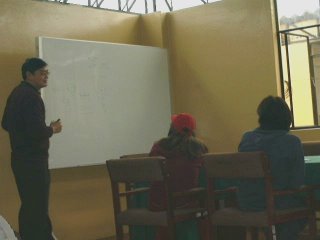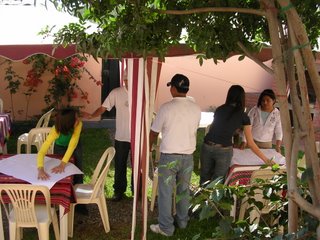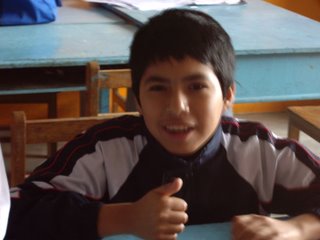
About four years ago, five young and enterprising young men and women decided to leave the comfortable shores of Singapore to experience the adventures of social entrepreneurship in a different culture, and we arrived at the rocky shores of Peru, a land filled with spectacular views of natural wonders, which are contrasted against the stark reality of poverty that so many people find themselves struggling against every day. Against this backdrop, we started various projects to help the people around us, and I am going to bring us down a trip through the memory lanes of time through a series of blog entries from time to time that I shall call "A Trip Down Memory Lane". The picture here shows Julian teaching English to three single mums in a relatively small classroom in a youth club in the district of Surco four years ago. This was the first time that our NGO started English classes here in Peru. It was a very small class, comprising of two single mothers and two other young mothers coming from extremely poor backgrounds. Attendance was highly irregular as well, and I remember that there was this mum who could not turn up for class because her husband wanted her to accompany him and threatened to beat her up if she went for her English class. The irregularity of attendance and the slowness of the students in learning made it relatively frustrating at times. This was compounded by the fact that our Spanish was not too good at that time, resulting in various kinds of communication problems. (I have a few nice jokes that took place during miscommunications with the students, but I will save them for another blog entry.) Julian and I did not have any jobs at that time, so we took turns to teach the class. The students paid about S$10 for the entire course that lasted about 12 sessions. One of our friends from Singapore, Jeffrey Chong, visited us at that time and joined us for one of the classes, and he was quite surprised at how little the students were paying for the course.
Julian has a masters degree in engineering from the National University of Singapore, while I had just quit from my job as a legal manager shortly before coming to Peru. Many of our visitors had a simple question for us: Why were two highly qualified professionals spending time teaching English to four mums, and getting paid a mere S$10 per student for the entire course of 12 sessions, an amount which could not even cover our transport expenses and photocopying expenses? It was not even one percent of my pay in Singapore! Furthermore, it was not even a good start to our community work here - the irregularity in attendance and the slowness in learning meant that none of the students passed the course - because they did not turn up for the exam.
I am not sure about Julian, but I had my fair share of disappointments and discouragements at that time. No income, no results and no support from the people we were working with - there were moments that I felt so "useless" and not knowing what to do then that I cooped myself in our small office and played "Pinball" on my computer for hours on end, so much so that I was breaking all kinds of "Pinball" records on the computer and becoming a "Pinball" king. However, as I reflect back on those early days, I think the experience that we gained through this first project provided a seed foundation upon we built our subsequent successes, both at a corporate level as well as a personal level. By building our projects and advancing our mission here in Peru from the "seed" level, we were able to improve the quality of our subsequent successes. Whenever we seem to be doing something that seems small or insignificant at face value, it is good to remember the principle of the seed. Seeds are small in nature, but when nurtured properly, they will grow into gigantic trees one day.
At a personal level, as I reflect back now, it was a time when we discovered the secret of having great joy even when you have little - the five of us did not have much economic means at that time - with only two out of the five of us holding some form of jobs that paid a regular if meagre income, but we supported one another like a family, and none of us were ever in need, and we could even afford the occasional luxuries of life such as short getaways to different parts of Peru. Today, our economic means have improved by quite a bit since those early days, but the difficult times of those early days have helped us to learn to appreciate one another more, and to recognize and remember that true joy and significance does not lie in our increasing incomes, but in the friendship that we have with one another, and in the efficacy of heart in which we go about sharing our time, treasures and talents to improve the quality of the lives of those around us.
A nice quote from Mahatma Gandhi succintly sums up what I am trying to say today: "Joy lies in the fight, in the attempt, in the suffering involved, not in the victory itself." The Christian apostle Peter had a similar view when he said in the sixth verse of the first chapter of his first letter: "So be truly glad! There is wonderful joy ahead, even though the going is rough for a while down here."














